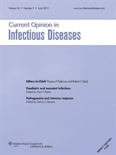
CURRENT OPINION IN INFECTIOUS DISEASES
Scope & Guideline
Advancing Insights in Infectious Disease Research
Introduction
Aims and Scopes
- Infectious Disease Management and Treatment:
The journal covers a wide array of infectious diseases, detailing current treatment options, management strategies, and emerging therapies for various infections. This includes bacterial, viral, fungal, and parasitic infections, with a particular emphasis on multidrug-resistant pathogens. - Diagnostic Innovations:
A significant focus is placed on advancements in diagnostic methods, including molecular diagnostics, artificial intelligence, and machine learning applications that enhance the accuracy and speed of infectious disease diagnosis. - Infection Prevention and Control:
The journal addresses strategies and controversies in infection prevention, particularly in vulnerable populations such as immunocompromised patients, pregnant women, and the elderly, highlighting best practices and challenges in clinical settings. - Epidemiological Insights:
CURRENT OPINION IN INFECTIOUS DISEASES provides analyses on epidemiological trends and public health implications of infectious diseases, including the impact of global issues like climate change and pandemics on infection dynamics. - Host-Pathogen Interactions:
Research on the interactions between hosts and pathogens, including immune responses and the implications for treatment and prevention strategies, is a core area of focus, contributing to a deeper understanding of infection biology.
Trending and Emerging
- Impact of COVID-19 on Infectious Disease Practices:
The ongoing influence of the COVID-19 pandemic has led to a surge in research focused on its implications for infectious disease management, prevention strategies, and the long-term effects on patients, particularly those with comorbidities. - Integration of Artificial Intelligence and Machine Learning:
There is a notable increase in publications discussing the application of AI and machine learning in diagnostics, treatment planning, and infection control, highlighting the journal's commitment to embracing innovative technologies in healthcare. - Focus on Vulnerable Populations:
Emerging research emphasizes the challenges faced by vulnerable populations, such as the immunocompromised, pregnant women, and marginalized communities, reflecting a growing recognition of health disparities in infectious disease outcomes. - Resilience Against Antimicrobial Resistance (AMR):
Research addressing strategies to combat antimicrobial resistance, including novel therapeutics and stewardship programs, is gaining traction, underscoring the urgency of this global health threat. - Exploration of the Microbiome's Role in Disease:
An increasing number of studies are investigating the microbiome's impact on health and disease susceptibility, indicating a trend towards understanding complex host-pathogen interactions and their clinical implications.
Declining or Waning
- Traditional Antibiotic Stewardship Approaches:
While antibiotic stewardship remains critical, there has been a noticeable decline in discussions surrounding traditional approaches, possibly due to the emergence of more innovative methods and technologies, such as machine learning and precision medicine. - Basic Research in Non-Clinical Settings:
There appears to be a waning focus on basic research that does not directly translate into clinical practice or public health policy, as the journal increasingly prioritizes studies with immediate clinical relevance. - Generalized Vaccination Strategies:
The journal has shifted away from broad discussions of vaccination strategies in favor of more targeted analyses, particularly regarding specific populations or emerging infectious threats, suggesting a decline in interest in generalized vaccination discussions.
Similar Journals

Infectious Agents and Cancer
Bridging disciplines to enhance understanding of cancer's infectious triggers.Infectious Agents and Cancer is a pivotal open access journal published by BMC, dedicated to advancing research at the intersection of infectious diseases and oncology. Since its inception in 2006, this journal has provided a platform for the exploration of the complex relationships between infectious agents and cancer development, aimed at researchers, healthcare professionals, and students alike. With a broad scope encompassing epidemiology and cancer research, the journal holds an impressive ranking in the Q3 quadrant for epidemiology, infectious diseases, and oncology in 2023, while also featuring in the Q4 category for cancer research. This distinguished journal not only contributes to the enrichment of scientific knowledge but also fosters collaborative efforts towards innovative solutions in the fight against cancer. Being part of the UK publishing landscape, the journal is accessible to a global audience, ensuring that vital research findings are disseminated widely to inform policy and practice in health sciences.

Journal of Clinical Virology Plus
Innovating the landscape of clinical virology research.The Journal of Clinical Virology Plus, published by Elsevier, is an essential resource for researchers and professionals in the fields of virology and infectious diseases. Launched in 2021, this journal aims to bridge the gap between clinical research and application, fostering a deeper understanding of viral pathogenesis, diagnostics, and therapeutic strategies. With an ISSN of 2667-0380, this open-access journal brings cutting-edge findings to the global scientific community, facilitating the rapid dissemination of knowledge critical for advancing public health. Positioned in the Q3 category for both Infectious Diseases and Virology in 2023, its ranking reflects its growing influence and relevance in the academic landscape. The journal strives to support innovative research, collaborative studies, and comprehensive reviews that address contemporary challenges in clinical virology. As it converges through the years from 2021 to 2024, Journal of Clinical Virology Plus aims to be a central hub for vital discussions and breakthroughs in this dynamic field.
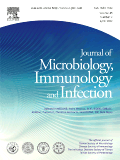
JOURNAL OF MICROBIOLOGY IMMUNOLOGY AND INFECTION
Unlocking the mysteries of infection and immunity.Welcome to the Journal of Microbiology Immunology and Infection, a premier academic publication established in 1998 and now proudly owned by Elsevier Taiwan. As an Open Access journal since 2016, it provides unrestricted access to groundbreaking research in the fields of immunology, microbiology, and infectious diseases, making it an essential resource for researchers, practitioners, and students alike. The journal holds impressive rankings, including Q1 status in categories such as Infectious Diseases and Microbiology (medical), and a notable 92nd percentile in its Scopus ranking for Medicine - Infectious Diseases. With a dedicated focus on advancing knowledge and fostering collaboration within the scientific community, the Journal of Microbiology Immunology and Infection is committed to publishing high-impact research that significantly influences practice and policy in healthcare and life sciences. The journal is also recognized for its contribution to the ongoing dialogue surrounding contemporary issues in immunology and infection, positioning it as a vital platform for scholarly exchange and innovation.
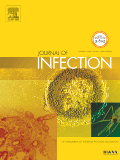
JOURNAL OF INFECTION
Exploring Innovations in Microbial ResearchJOURNAL OF INFECTION is a premier academic publication in the fields of infectious diseases and medical microbiology, published by W B SAUNDERS CO LTD. With a profound impact factor and established since 1979, this journal serves as a crucial resource for researchers, clinicians, and policy-makers seeking to advance knowledge and understanding of infectious processes and their management. The JOURNAL OF INFECTION holds an impressive position in the academic hierarchy as reflected by its Q1 quartile rankings in both Infectious Diseases and Microbiology (medical) for 2023, further underscored by its Scopus rankings: #2 in Medical Microbiology and #5 in Medical Infectious Diseases, placing it in the 98th percentile overall. While the journal does not offer Open Access options, it provides a comprehensive outlet for innovative research, reviews, and clinical insights that drive the field forward. Published from the United Kingdom, it attracts a global readership keen on staying at the forefront of infectious disease research, making it an essential addition to any academic and clinical library.

Current Fungal Infection Reports
Unveiling breakthroughs in mycology and infection control.Current Fungal Infection Reports is an essential academic journal dedicated to the rapidly evolving field of mycology, specifically focusing on the diagnosis, treatment, and epidemiology of fungal infections. Published by Springer, this journal aims to provide a comprehensive platform for researchers, healthcare professionals, and scholars to disseminate groundbreaking findings and insights into the complexities surrounding fungal diseases. With an ISSN of 1936-3761 and an E-ISSN of 1936-377X, the journal is recognized in the Q3 category for Infectious Diseases as of 2023 and holds a Scopus rank of #199 out of 344 in its field, showcasing its growing influence. Although not currently open access, Current Fungal Infection Reports remains an important resource for those wishing to stay updated on key developments and trends within this critical area of global health. Through its commitment to advancing knowledge and fostering academic exchange, the journal plays a crucial role in combating the challenges posed by fungal infections, making it a must-read for anyone involved in infectious disease research and treatment.
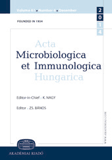
ACTA MICROBIOLOGICA ET IMMUNOLOGICA HUNGARICA
Advancing knowledge in microbiology and immunology.ACTA MICROBIOLOGICA ET IMMUNOLOGICA HUNGARICA is a distinguished academic journal published by AKADEMIAI KIADO ZRT, focusing on significant advancements in the fields of microbiology, immunology, and infectious diseases. Established in 1994, this journal serves as a vital platform for researchers, professionals, and students keen on exploring the complexities of microbial interactions and immune responses. With a current Impact Factor reflecting its rank within the Q3 categories for Immunology, Microbiology, and Infectious Diseases, it retains a critical position in disseminating innovative research. Although not open access, the journal provides extensive insights disseminated through various academic databases, ensuring a broad reach within the scholarly community. Its convergence over three decades indicates a robust commitment to excellence in scientific inquiry and knowledge sharing. As it moves towards the future, ACTA MICROBIOLOGICA ET IMMUNOLOGICA HUNGARICA continues to uphold its legacy of fostering collaborative research initiatives that contribute to the understanding and treatment of microbial diseases globally.

MEDICAL MICROBIOLOGY AND IMMUNOLOGY
Connecting microbial insights with immune system advancements.Medical Microbiology and Immunology is a renowned journal published by Springer, serving as a pivotal resource in the fields of microbiology and immunology. Established in 1971 and continuing its legacy through 2024, this journal features cutting-edge research and reviews that address critical advancements and challenges within these dynamic fields. With an impressive impact factor and a robust ranking, including Q1 categories in both Microbiology (medical) and Immunology, it stands at the forefront of scholarly communication, ranking 21st out of 140 in the realm of Medical Microbiology. Researchers and professionals are encouraged to explore a variety of studies that delve into the interactions between microorganisms and the immune system, making it an essential resource for anyone fascinated by these interconnected realms of health sciences. Although not open access, the journal is widely accessible through institutional libraries, ensuring that significant findings reach a global audience. The University of New York Plaza serves as its operational hub in the USA, reinforcing its international influence and dedication to advancing knowledge in microbiology and immunology.
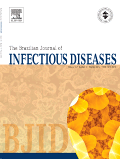
Brazilian Journal of Infectious Diseases
Transforming clinical practice with cutting-edge studies.The Brazilian Journal of Infectious Diseases, published by Elsevier Brazil, is a premier open-access journal dedicated to advancing research and clinical practice in the field of infectious diseases. Since its inception in 2001, this journal has been pivotal in disseminating innovative studies and reviews that inform healthcare professionals and researchers alike. With an impressive impact factor reflected by its ranking in the second quartile for Infectious Diseases and third quartile for Medical Microbiology in 2023, the journal ranks #127 out of 344 in medicine – infectious diseases and #61 out of 140 in medical microbiology, showcasing its reputable standing in the scientific community. The Brazilian Journal of Infectious Diseases invites contributions that highlight significant findings, novel methodologies, and critical reviews aimed at enhancing patient care and public health initiatives. With an international readership and a focus on pressing issues in infectious diseases, it serves as an essential platform for knowledge exchange and collaboration among scholars and practitioners across Brazil and beyond. By reinforcing the importance of open access to scientific literature, this journal not only promotes transparency but also enhances the global discourse surrounding infectious diseases.

Therapeutic Advances in Infectious Disease
Advancing the frontiers of infectious disease treatment.Therapeutic Advances in Infectious Disease is a distinguished journal published by SAGE Publications Ltd, dedicated to advancing knowledge in the vital field of infectious diseases and pharmacology. With an impactful Open Access model since 2019, the journal facilitates unrestricted access to a wealth of high-quality research, enabling researchers, clinicians, and educators to stay at the forefront of infectious disease management and treatment. As a recognition of its contribution to the scientific community, the journal holds a prestigious Q1 quartile ranking in both Infectious Diseases and Medical Pharmacology as of 2023, underscoring its influence and relevance in these domains. The journal is positioned favorably within the Scopus rankings, with an impressive standing in the diverse categories of Medicine, emphasizing its commitment to disseminating innovative research. Through a rigorous peer-review process and a broad scope that covers therapeutic advancements, Therapeutic Advances in Infectious Disease serves as an essential resource for anyone involved in combating infectious diseases, offering insights that drive clinical applications and enhance patient care.

Tumour Virus Research
Pioneering research in the fight against viral cancers.Tumour Virus Research, an esteemed journal published by Elsevier, serves as a vital resource in the fields of cancer research, infectious diseases, and virology. With an impact factor reflective of its influence and recognized as a Q2 journal in multiple categories as of 2023, it rigorously presents high-impact research dedicated to the understanding of viral pathogens in tumorigenesis. Since its transition to an Open Access model in 2021, the journal has enhanced accessibility, empowering researchers and the academic community globally to explore cutting-edge findings. The journal covers a broad scope, encompassing the intricate interactions between viruses and cancer biology, which is crucial for developing novel therapeutic strategies. With a commitment to advancing scientific knowledge, Tumour Virus Research welcomes submissions that push the boundaries of current understanding and contribute to the ongoing battle against virus-mediated cancers, making it an indispensable publication for professionals, researchers, and students in the field.